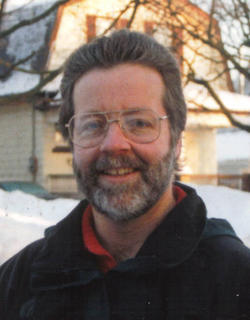 Jeffrey Barlough's "Strange Cargo" was the first domino to drop. The challenge of making a list and attacking it had got under my skin so I decided to dive right into a second title on my challenge. Of course, it didn't hurt at all that Harry Harrison's "West of Eden" had been selected as the group read of the month for January. Bonus! Here's my 4-star review:
Jeffrey Barlough's "Strange Cargo" was the first domino to drop. The challenge of making a list and attacking it had got under my skin so I decided to dive right into a second title on my challenge. Of course, it didn't hurt at all that Harry Harrison's "West of Eden" had been selected as the group read of the month for January. Bonus! Here's my 4-star review:With “West of Eden”, Harry Harrison’s abundantly fertile imagination has posited a unique and intensely challenging alternate history. What if dinosaurs had avoided extinction and evolved into a sentient, intelligent, technology-savvy species vying for supremacy on an ice age earth with a less advanced homo sapiens still struggling at the hunter-gatherer stage of evolution?
As global weather patterns deteriorate and the ice age earth begins to chill precipitately, the human Tanu species find themselves pushed into contact with the reptilian Yilanè species. What starts as a lack of understanding and inability to communicate with one another escalates into armed territorial conflict and ultimately festers into intense hatred and an all-out war that can only culminate in complete extermination of one or the other species. Kerrick, a young boy and the sole survivor of a human group of hunters slaughtered by a Yilanè scouting party, is imprisoned by his enemy and grows to manhood among them. Learning their language and culture, he adapts to survive and his links to humankind fade to a distant and all but irretrievable memory. Ultimately, events force those memories to the surface and Kerrick escapes. He struggles to re-learn his true place in the world and becomes the only warrior with the knowledge and skills capable of leading the Tanu to ultimate victory over the rapacious Yilanè.
Harrison’s creations in “West of Eden” are, to say the least thought provoking. The fascinating science of the story, both hard and soft, has clearly been thought through most carefully – genetic engineering and the use of bio-technology at a time when those fields of scientific endeavour were all but embryonic in real-life; the creation of a language and syntax that is obviously (and correctly so) tied closely to Yilanè culture, custom and physiology; the plausible anthropological development of a society that is based on a matriarchal lineage with a class structure that in some respects bears a resemblance to ants or bees.
Our status as readers will be primarily human (at least I expect so)! Inevitably, most of us human readers will slot the Yilanè into the bad-guy role of the novel and our natural prejudices will find us cheering the Tanu on to victory. This almost unavoidable characterization (good guy/bad guy, Tanu/Yilanè) will probably lead many critical readers to the conclusion that Harrison was also using “West of Eden” as a platform to express his personal objections to the US participation in the Vietnam War – a belligerent, spiteful, technologically superior nation (the Yilanè US) attempting to overpower the Vietcong Tanu, a more agrarian society seeking only to maintain their more earthy way of life. The analogy comes complete with a metaphor for the US draft dodgers and conscientious objectors – see if you don’t agree as you read about “The Daughters of Death”!
A fascinating combination of conflict and high adventure, convincing science and alternate history make “West of Eden” a novel well worth the reading for any fan of quality science fiction.
Paul Weiss







